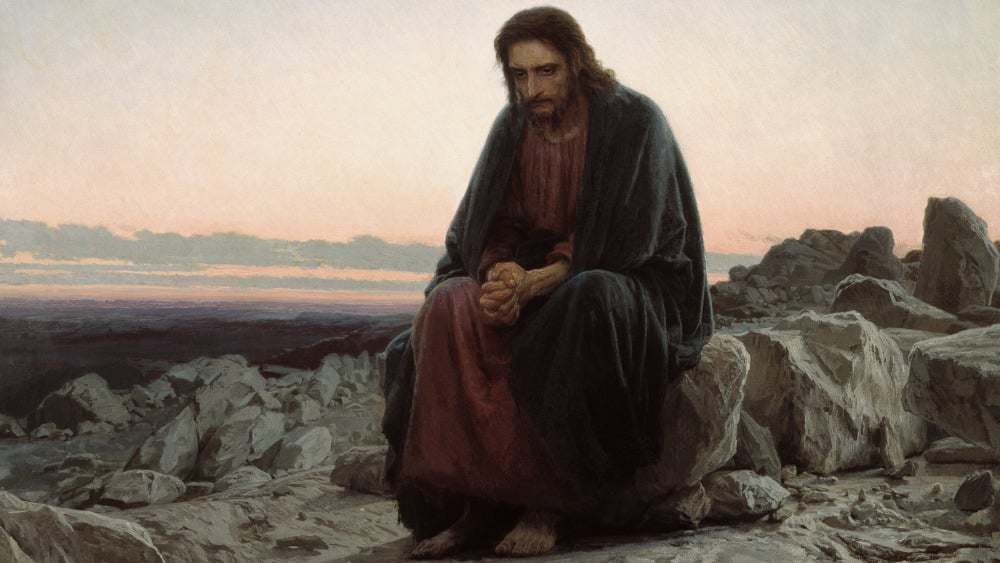In my high school chapel there was an infamous Bible.
It hadn’t suffered any vandalism or torn pages; no printing errors or scribbles. Each word was the same as every NIV Bible we had ever picked up. And that was exactly the point. On the inside cover, someone had written three words: “Spoiler: Jesus dies”.
It was funny (not that funny, but we were sixteen-year-olds passing time in chapel) partly because the idea that someone wouldn’t know the end of this story was laughable.
There is no bigger question than, “Who is Jesus?”. We all think we know the answer, but we could all benefit from listening to the answer of the New Testament itself another time.
Over several chapters of his gospel, Saint Luke puts the question in the mouths of everyone around this enigmatic carpenter-turned-preacher.
“Who is this man?” ask the crowds, the guests of a pharisee, Herod the Tetrarch, the disciples of John the Baptist and the disciples of Jesus himself. “Who is this man with heavenly authority; with power over the wind and the waves and even over sin and death?”
Finally, Jesus tackles the question head-on.
Who do you say I am?
Only once he has raised this mystery again and again does Luke turn to provide answers about Jesus’ identity.
Finally, Jesus tackles the question head-on. “Who do the crowds say I am?” he asked his disciples.
Maybe John the Baptist, maybe Elijah, maybe one of the prophets of long ago, they replied.
“But what about you?” he asked. “Who do you say I am?”
Peter answered on their behalf: “God’s Messiah.” (Luke 9:18-20, partly paraphrased)
From the moment Peter recognises him as Messiah, Jesus takes great pains to dismantle the disciples’ expectations.
A dark warning
From this point on, everything changes, and Luke’s gospel takes on a darker tone. The focus shifts from Jesus’ ministry of miracles and healing to his preparation for the suffering that looms before him.
From the moment Peter recognises him as Messiah, Jesus takes great pains to dismantle the disciples’ expectations – hopes bred over a millennium of war, exile, slavery and occupation; hopes for a mighty king and a restored Jerusalem. Is that what Jesus represents? Not in the way they think.
“The Son of Man,” he immediately warns, “must suffer many things and be rejected by the elders, the chief priests and the teachers of the law, and he must be killed and on the third day be raised to life” (Luke 9:22). You expect a conqueror, he warns, but my fate is to be conquered. Then – only then – will I triumph.
For us, so far so good. Jesus dies and comes back to life. We are numb to the sheer strangeness and unpredictability of the story – what has been called “the scandal of the cross”.
The cost of discipleship
It is always worth reflecting on the utter uniqueness of the Christian claim: God – in Christ – died.
But first, note how quickly Jesus moves on to the implications of his fate. Immediately after Peter identifies him as God’s anointed one and Jesus warns the disciples that he will suffer, he continues, “Whoever wants to be my disciple must deny themselves and take up their cross daily and follow me” (9:23).
From this point, new themes invade Luke’s gospel: the suffering and vindication of Jesus absolutely; but also the requirements for those who follow him – the suffering and vindication of his disciples.
“No one who puts a hand to the plow and looks back is fit for service in the kingdom of God.” – Jesus
Luke reports that, as they were walking along the road, a man said to Jesus, “I will follow you wherever you go.”
Jesus replied, “Foxes have dens and birds have nests, but the Son of Man has no place to lay his head.”
He told another man to follow him, to which the man replied, “Lord, first let me go and bury my father.”
Jesus said to him, “Let the dead bury their own dead, but you go and proclaim the kingdom of God.”
Still another said, “I will follow you, Lord; but first let me go back and say goodbye to my family.”
Jesus replied, “No one who puts a hand to the plow and looks back is fit for service in the kingdom of God” (9:57-62, partly paraphrased).
Woah!
We must not be too quick to water down Jesus’ words.
The expressions and requests of these men seem completely reasonable; whereas Jesus seems, frankly, demanding. There are significant questions to ask of the text, with answers that may help in quelling any concerns this raises about Jesus’ character.
But we must not be too quick to water down Jesus’ words. What he demands is clear: if you follow Jesus, he is your highest allegiance. Following him means knowing Earth is not your home; following him takes precedence over your most important cultural and familial obligations; following him means your life’s work is service in the kingdom of God.
Who is Jesus to ask this much?
The road to Jerusalem
These interactions took place, Luke informs us, on the way to Jerusalem. Shortly before this (about eight days after Peter’s declaration), Jesus took his three amigos (Peter, James and John) up a mountain to pray. While he prayed, his face changed and his clothes flashed as bright as lightning. Moses and Elijah appeared “in glorious splendor”, speaking with Jesus about his departure (his ‘exodus’), which he was about to fulfil at Jerusalem. As Moses and Elijah were leaving, a cloud covered them all, from which came a voice: “This is my Son, whom I have chosen; listen to him” (9:28-36, partly paraphrased).
In the words of God himself – who long ago had guided Israel as a pillar of cloud – who is Jesus? He is Messiah, Son of God, the Great Prophet (the ‘new Moses’, about to bring about his exodus), the promised King and the eternal Son of Yahweh himself.
But following Jesus, whatever demands he makes, is not a matter only of recognising his status as Prophet, Christ and Son of God.

Jesus’ exodus came at the cost of death on a Roman cross. Yet it was he who was “about to bring [it] to fulfilment at Jerusalem” (9:31b). In fact, Luke tells us, after he had again predicted his excruciating and shameful death, “Jesus resolutely set out for Jerusalem” (9:51b, emphasis added).
Following Jesus, whatever demands he makes, is also a matter of recognising that “being in very nature God … he made himself nothing … and being found in appearance as a man, he humbled himself by becoming obedient to death – even death on a cross! Therefore God exalted him to the highest place and gave him the name that is above every name” (Philippians 2:6-9, emphasis added).
Following Jesus – the Great Prophet, the promised King and the Son of God – means taking up your cross daily to follow the one who took up his cross for you, knowing that you will be vindicated and glorified with him.


